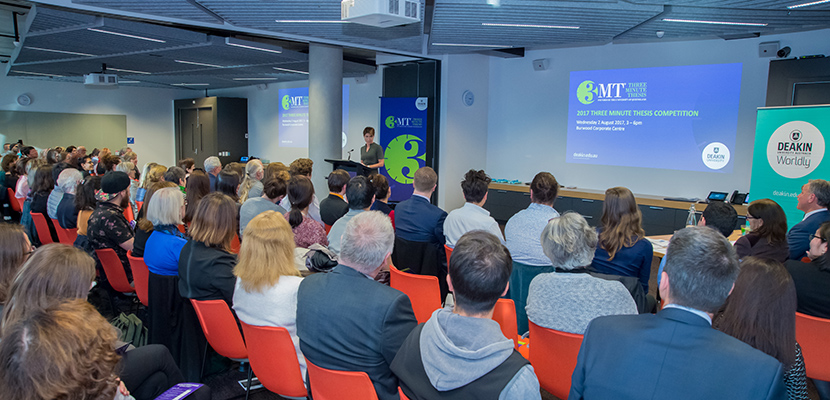Deakin Law School’s Paul McGorrery is the University’s 3MT winner for 2017.
• Warning: This article contains material about family violence.
The breadth of Deakin University PhD research was on display as this year’s 3MT finalists distilled the essence of their work into just three minutes.
From finding new ways to store hydrogen to stemming the decline in STEM, the 10 contestants enthralled and educated the audience and judges, explaining how sleep affects athlete performance, demonstrating that innovative infrastructure can protect communities from floods and detailing how birds communicate with their embryos.
Deakin Law School PhD candidate Mr Paul McGorrery’s compelling explanation of why the prosecution of psychological harm in the legal system needs to change was declared the winner by judges Professor Trish Livingston, Associate Dean (Research) Faculty of Health, Professor Chris Hickey, Chair of Academic Board, and Alfred Deakin Professor Jill Blackmore AM.
Ms Julie Gaburro, from the Institute for Intelligent Systems Research and Innovation (IISRI), was named Runner Up, as well as the People’s Choice Award Winner, for her research on Zika virus affected mosquitoes using IISRI’s “brain on a chip” technology. Her work has revealed valuable insights into how Zika virus manipulates neurons and how a cure might be found for brain infections caused by such viruses.
Ms Lara Hedberg, from the School of Communication and Creative Arts, was commended for her presentation on “Queer girls and where to find them” – based on her study of the portrayal of gay and lesbian characters in children’s and young adult fiction.
Mr McGorrery will now represent Deakin at the 3MT Asia-Pacific finals at the University of Queensland on 29 September for a chance to win a $5000 research travel grant as well as funding and entry to the 2017 Falling Walls Lab Final and Conference in Berlin.
His PhD is investigating how Australia’s already existing laws prohibiting psychological harm can be better enforced by police and prosecutors to hold family violence perpetrators accountable for the mental, as well as physical, trauma inflicted on victims.
“A few years ago I was working as a criminal prosecutor in Melbourne, and I was prosecuting a man for a particularly horrific case of family violence against his wife,” he told his 3MT audience.
[testimonial_text]The problem I faced in the case was that the criminal law was ready to punish him for the physical harm that he had caused but, while it certainly wasn’t trivial, it paled in comparison to the lasting psychological trauma she had suffered. And at the time, the criminal law wasn’t ready to hold him accountable for that.[/testimonial_text]
[testimonial_picture name=”Paul McGorrery” details=”Deakin Law School”]
 [/testimonial_picture]
[/testimonial_picture]The harrowing case was the catalyst for Mr McGorrery’s research.
“The question I want to answer with my research is, if criminal law prohibits us from causing physical harm to one another, then to what extent should it also prohibit us from causing psychological harm?” he said.
“We already have the legal framework in Australia to prosecute people for causing psychological harm to others, so my hope is that any publicity that comes from my 3MT involvement will help to encourage prosecutors around the country to re-think their approach to prosecuting non-physical forms of family violence.”
Mr McGorrery, a lawyer with the Victorian Sentencing Advisory Council and an admitted attorney in New York, said his win was exciting, and that he was grateful for the support of his supervisors Associate Professor Marilyn McMahon and Associate Professor Kelley Burton, his wife Dawn, and all the staff at Deakin Law School.
“In a way, the 3MT is harder than the courtroom,” he said. “It’s much easier to champion someone else’s cause than your own.”
• If you have personal concerns about family violence, you can contact the safe steps Family Violence Response Centre for support, information and referral to services on 1800 015 188, 24 hours a day, seven days a week. If you are in immediate danger, call 000.
View Deakin 3MT finalist playlist:




